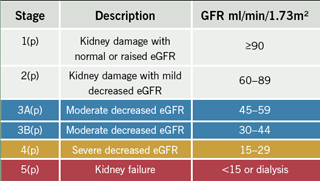Weight Cycling Effects on Kidney Function in Type 1 Diabetes
- Jun 12, 2025
- 3 min read
A recent article in Endocrine Today looks at how weight cycling may worsen kidney function in adults with type 1 diabetes. "Yo-yo" dieting is present among 35% of males and 55% of females leading to periods of weight loss and gain, often resulting in an overall net gain of weight. Weight cycling has previously been found to have major impacts on relationships with food and body image as well.
Kidney disease is already more prevalent in folks with diabetes so the added risk with weight cycling is quite concerning. Studies found there was a 40% decline in estimated glomerular filtration rate (eGFR) and a doubling of serum creatinine levels in people that had weight cycling, showing an overall worsening of kidney function. These are the two major blood lab levels that estimate kidney function. The chart below shows the stage of kidney disease associated with each range of eGFR. Stage 5 CKD is when dialysis is needed to help filter the blood for removal of waste byproducts and excess fluid.

The Study looked at 1,432 participants that had type 1 diabetes over a period of 18 or more years. They found that weight cycling was associated with:
18.8% participants had >40% decrease in eGFR
8.6% participants had doubled their Creatinine levels
8.9% participants developed chronic kidney disease (CKD) stage 3
What can be seen in this study is that not only do people with type 1 diabetes need to lose weight, but also maintain the weight loss in order to prevent worsening of kidney function and diabetes control. The best treatment for both CKD and diabetes is prevention. It was found that keeping tight blood sugar control (A1c <7%) helped to decrease diabetic kidney disease by 54%. Continuous glucose monitors are extremely helpful in achieving this tight blood sugar control. It is unclear so far if the use of SGLT2 inhibitors and GLP-1's are a good treatment option for people with type 1 diabetes to prevent diabetic kidney disease due to the increased risk for diabetic ketoacidosis which is a life threatening complication caused by high blood sugars.
A different study did look at the use of the GLP-1 inhibitor Semaglutide in people with type 2 diabetes over a period 3.4 years. The group receiving Semaglutide had 24% fewer major kidney disease events than those in the placebo group. The eGFR was decreased in addition to lower rates of death from cardiovascular causes (18% lower in GLP-1 group). This study does show that risk of kidney disease and cardiovascular events can be decreased in people with type 2 diabetes and chronic kidney disease using GLP-1 inhibitors. However, the follow-up does not extend far enough to see the risk of weight regain and weight cycling when coming off GLP-1's. The study was also conducted on people with type 2 diabetes, so although promising, does not correlate directly to people with type 1 diabetes.
More research is needed on the impact of GLP-1 medications on diabetes and chronic kidney disease, but what we do know for now is that prevention of these two chronic diseases is the best treatment and can be achieved with healthy and consistent diet changes and tight blood glucose control.
Resources:
Endocrine Today March 2025, Vol 23, No 3 written by Michael Monostra with perspective by Lance Sloan MD








































Comments